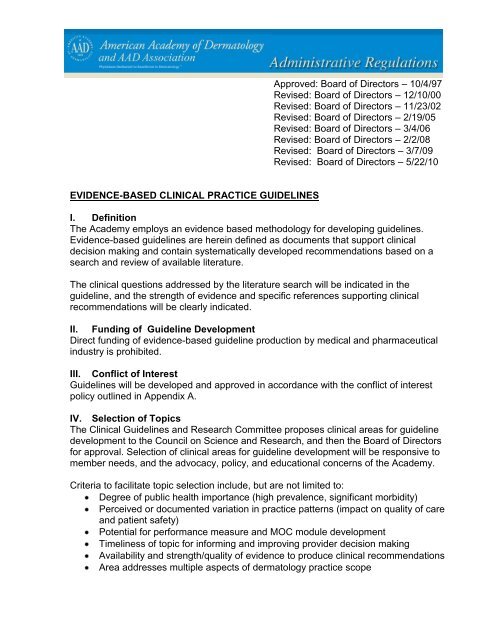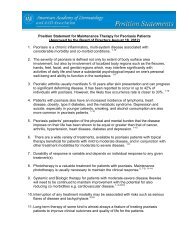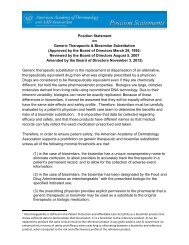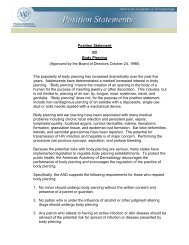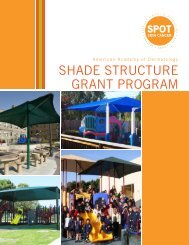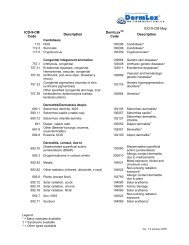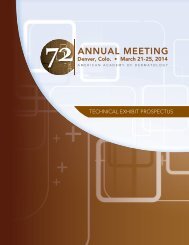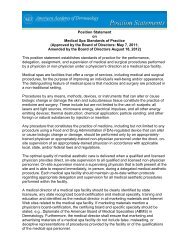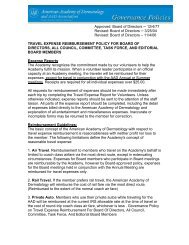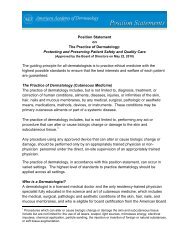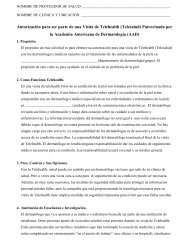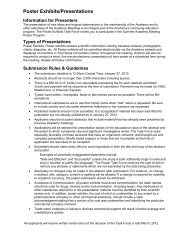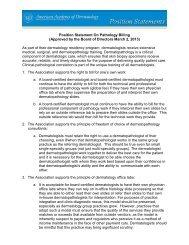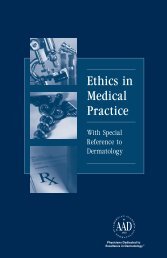SPORTS COMMITTEE - American Academy of Dermatology
SPORTS COMMITTEE - American Academy of Dermatology
SPORTS COMMITTEE - American Academy of Dermatology
- No tags were found...
Create successful ePaper yourself
Turn your PDF publications into a flip-book with our unique Google optimized e-Paper software.
Approved: Board <strong>of</strong> Directors – 10/4/97<br />
Revised: Board <strong>of</strong> Directors – 12/10/00<br />
Revised: Board <strong>of</strong> Directors – 11/23/02<br />
Revised: Board <strong>of</strong> Directors – 2/19/05<br />
Revised: Board <strong>of</strong> Directors – 3/4/06<br />
Revised: Board <strong>of</strong> Directors – 2/2/08<br />
Revised: Board <strong>of</strong> Directors – 3/7/09<br />
Revised: Board <strong>of</strong> Directors – 5/22/10<br />
EVIDENCE-BASED CLINICAL PRACTICE GUIDELINES<br />
I. Definition<br />
The <strong>Academy</strong> employs an evidence based methodology for developing guidelines.<br />
Evidence-based guidelines are herein defined as documents that support clinical<br />
decision making and contain systematically developed recommendations based on a<br />
search and review <strong>of</strong> available literature.<br />
The clinical questions addressed by the literature search will be indicated in the<br />
guideline, and the strength <strong>of</strong> evidence and specific references supporting clinical<br />
recommendations will be clearly indicated.<br />
II. Funding <strong>of</strong> Guideline Development<br />
Direct funding <strong>of</strong> evidence-based guideline production by medical and pharmaceutical<br />
industry is prohibited.<br />
III. Conflict <strong>of</strong> Interest<br />
Guidelines will be developed and approved in accordance with the conflict <strong>of</strong> interest<br />
policy outlined in Appendix A.<br />
IV. Selection <strong>of</strong> Topics<br />
The Clinical Guidelines and Research Committee proposes clinical areas for guideline<br />
development to the Council on Science and Research, and then the Board <strong>of</strong> Directors<br />
for approval. Selection <strong>of</strong> clinical areas for guideline development will be responsive to<br />
member needs, and the advocacy, policy, and educational concerns <strong>of</strong> the <strong>Academy</strong>.<br />
Criteria to facilitate topic selection include, but are not limited to:<br />
Degree <strong>of</strong> public health importance (high prevalence, significant morbidity)<br />
Perceived or documented variation in practice patterns (impact on quality <strong>of</strong> care<br />
and patient safety)<br />
Potential for performance measure and MOC module development<br />
Timeliness <strong>of</strong> topic for informing and improving provider decision making<br />
Availability and strength/quality <strong>of</strong> evidence to produce clinical recommendations<br />
Area addresses multiple aspects <strong>of</strong> dermatology practice scope
Administrative Regulation - Evidence-Based Clinical Practice Guidelines<br />
Page 2 <strong>of</strong> 8<br />
An area in which increased dermatologic attention and involvement would be<br />
helpful for the specialty<br />
Relevant to Medicare and Medicaid programs<br />
Relevant to managed care programs<br />
Availability <strong>of</strong> interventions with high societal or economic cost<br />
V. Work Group Appointment and Activity<br />
The clinical question(s) and clinical recommendations for Board-approved guideline<br />
topics are developed by an appointed Work Group. <strong>Academy</strong> staff develop draft<br />
technical report(s) that address the clinical question(s) and inform recommendations.<br />
The Work Group is appointed by the Clinical Guidelines and Research Committee after<br />
a review <strong>of</strong> <strong>Academy</strong> conflict <strong>of</strong> interest full disclosure forms. The decision to allow or<br />
prohibit Work Group appointment is determined by deliberation over the nature <strong>of</strong><br />
disclosed financial and non-financial conflicts <strong>of</strong> interest, relevancy, and potential impact<br />
to the guideline topic as a parallel to member’s clinical expertise and/or leadership.<br />
A Work Group must minimally include 51% <strong>of</strong> experts without relevant financial conflict <strong>of</strong><br />
interest. The Chair <strong>of</strong> the Work Group is prohibited from having any relevant financial<br />
conflict <strong>of</strong> interest, unless the expertise and leadership is deemed necessary by the<br />
Clinical Guidelines and Research Committee. In this instance, a co-chair with no relevant<br />
financial conflict <strong>of</strong> interest will be appointed. The chair or co-chair must also remain free<br />
<strong>of</strong> relevant conflict <strong>of</strong> interest for at least one year after guideline publication.<br />
<strong>Academy</strong> staff and any contracted medical writer(s) supporting guideline development<br />
must provide full disclosure to the Work Group Chair prior to commencing guideline<br />
activity. <strong>Academy</strong> staff and the medical writer are prohibited from having any relevant<br />
financial conflicts <strong>of</strong> interest related to the guideline topic.<br />
Work Group members for whom a relevant conflict has been identified will be required<br />
to recuse from discussions, drafting, and voting on clinical recommendations or<br />
guideline text related to the identified conflict, unless otherwise requested by the Work<br />
Group Chair. Disclosure updates will be obtained from all Work Group members,<br />
medical writer(s) and <strong>Academy</strong> staff at regular intervals throughout the development<br />
process. The guideline text will indicate the full disclosure and recusal history for all<br />
listed authors to include the Work Group, Clinical Guidelines and Research Committee<br />
Chair or named liaison, and affiliated staff.<br />
The Clinical Guidelines and Research Committee may dismiss and/or appoint members<br />
to the Work Group to ensure the timely completion <strong>of</strong> a guideline, the integrity <strong>of</strong> the<br />
evidence based methodology and conflict <strong>of</strong> interest policy, and that all relevant areas<br />
<strong>of</strong> clinical expertise are reasonably addressed.
Administrative Regulation - Evidence-Based Clinical Practice Guidelines<br />
Page 3 <strong>of</strong> 8<br />
VI. Review Process<br />
Expert Review<br />
The Work Group produces a draft guideline which is submitted to the Clinical Guidelines<br />
and Research Committee for their approval, or if requested, further revision. This<br />
process may be repeated as necessary. Once approved by the Clinical Guidelines and<br />
Research Committee, the draft guideline is released to the membership for their review.<br />
Membership Review<br />
The draft guideline (marked ‘confidential’) is posted on the <strong>Academy</strong> Web site and may<br />
be accessed by member login only. Members will be given 10 business days to<br />
comment on the draft guideline, and are required to have a current disclosure statement<br />
with the <strong>Academy</strong>. Comments received in the absence <strong>of</strong> a current disclosure may be<br />
considered at the discretion <strong>of</strong> the Work Group Chair.<br />
Comments are compiled in a standard format and sent to the Work Group Chair for<br />
review and response to accept, reject, modify or request further information. Receipt <strong>of</strong>,<br />
and action on individual member comments is conveyed to the member in writing.<br />
Council on Science & Research Review<br />
Following the member comment period and incorporation <strong>of</strong> modifications to the draft<br />
guideline, the guideline is presented to the Council on Science and Research for their<br />
review and approval. Once approved by the Council, the draft guideline may be sent to<br />
the Board <strong>of</strong> Directors for final approval.<br />
V. Final Approval and Publication<br />
A final draft is approved by the Council on Science and Research and submitted for<br />
approval to the Board <strong>of</strong> Directors. Upon approval by the Board <strong>of</strong> Directors the<br />
guideline is posted on the <strong>Academy</strong> Web site and submitted to the editor <strong>of</strong> the Journal<br />
<strong>of</strong> the <strong>American</strong> <strong>Academy</strong> <strong>of</strong> <strong>Dermatology</strong> indicating the date <strong>of</strong> Board approval.<br />
The first author is the Chair(s) <strong>of</strong> the Work Group, followed by the names <strong>of</strong> the other<br />
members <strong>of</strong> the Work Group and medical writer in an order determined by the Work<br />
Group Chair(s), the Chair <strong>of</strong> the Clinical Guidelines and Research Committee or named<br />
liaison, and staff as appropriate.<br />
Board-approved guidelines will be submitted to the National Guideline Clearinghouse to<br />
support pr<strong>of</strong>essional and public access.<br />
VI. Review and Revision <strong>of</strong> Guidelines<br />
Board approved evidence-based guidelines will be considered for reaffirmation, update,<br />
or sunset at least every 5 years based on a review <strong>of</strong> published literature since<br />
guideline publication. The Clinical Guidelines and Research Committee will determine if<br />
the revisions are <strong>of</strong> such substance to require the review <strong>of</strong> the entire membership.<br />
Final Board approval will be required for guideline modifications that are deemed<br />
substantive enough to prompt member review.
Administrative Regulation - Evidence-Based Clinical Practice Guidelines<br />
Page 4 <strong>of</strong> 8<br />
Appendix A: Conflict <strong>of</strong> Interest Management in Guideline Development<br />
The following tables indicate the processes to evaluate and resolve identified conflicts <strong>of</strong> interest for guideline contributors<br />
following initial and periodic full disclosure during guideline development.<br />
The review <strong>of</strong> full disclosure will include deliberation on the nature <strong>of</strong> each disclosed interest, and the relevancy and<br />
potential impact <strong>of</strong> each relationship relative to the guideline topic and the importance <strong>of</strong> the member’s expertise (and<br />
leadership in the case <strong>of</strong> Chair appointments). The relevancy <strong>of</strong> each interest will be determined by the reviewing body,<br />
but is generally defined as any financial or other incentive which can reasonably be perceived by an independent observer<br />
as a potential source <strong>of</strong> bias within the guideline scope.<br />
Inquiries may be made by the evaluating body in order to determine if a prospective guideline contributor is willing to<br />
resolve certain conflicts prior to making a final decision. Periodic review <strong>of</strong> updated disclosure information will minimally<br />
occur prior to each meeting <strong>of</strong> the guideline contributor (conference call or in-person) where guideline materials for<br />
development or approval will be discussed.<br />
If the primary reviewing group is unable to reach a decision based on the provided information, the decision may be<br />
referred to the next <strong>Academy</strong> governing level or to the Ethics Committee for a final determination.<br />
Any implementation or change in the management <strong>of</strong> potential conflicts will be communicated to the member in writing<br />
and conveyed to the entirety <strong>of</strong> the Work Group, Clinical Guidelines and Research Committee (CGRC), Council on<br />
Science and Research, Board <strong>of</strong> Directors, and Ethics Committee as necessary. The management and resolution <strong>of</strong><br />
conflicts will be documented in the summation reports for all meetings where activity related to guideline development or<br />
approval will be discussed. The disclosures and recusal history for all Work Group members, medical writer(s) and<br />
affiliated staff will be included in the draft guideline and published with the Board approved text.<br />
Published guidelines will also contain the following standard conflict <strong>of</strong> interest statement to promote transparency:<br />
The <strong>American</strong> <strong>Academy</strong> <strong>of</strong> <strong>Dermatology</strong> (AAD) strives to produce clinical guidelines that reflect the best available<br />
evidence supplemented with the judgment <strong>of</strong> expert clinicians. Significant efforts are taken to minimize the potential for<br />
conflicts <strong>of</strong> interest to influence guideline content. Funding <strong>of</strong> guideline production by medical or pharmaceutical entities<br />
is prohibited, full disclosure is obtained and evaluated for all guideline contributors, and recusal is used to manage<br />
identified relationships. The AAD conflict <strong>of</strong> interest policy summary may be viewed at www.aad.org.
Administrative Regulation - Evidence-Based Clinical Practice Guidelines<br />
Page 5 <strong>of</strong> 8<br />
Guideline<br />
Contributor Disclosure Evaluation Initial Management Monitoring<br />
Work group<br />
chair(s)<br />
Required<br />
prior to<br />
appointment<br />
By the entire<br />
CGRC;<br />
The Chair and/or<br />
Co-Chair may<br />
not have<br />
relevant financial<br />
relationships,<br />
Work Group chair appointment permitted; no<br />
relationships disclosed, or disclosed information is<br />
not a possible source <strong>of</strong> bias.<br />
Work Group chair appointment prohibited;<br />
relevant relationships are unacceptable and could<br />
lead to inappropriate bias.<br />
Work Group chair appointment permitted with<br />
exception; relevant relationships are noted, but the<br />
need for expertise and leadership outweighs<br />
potential conflicts; a co-chair with no relevant<br />
financial interest is appointed. Chair<br />
responsibilities are permitted with recusal required<br />
for discussions and the formation <strong>of</strong> clinical<br />
recommendations relevant to the possible bias.<br />
Referred for further review and decision<br />
Chair responsibilities permitted; no<br />
relationships are disclosed or disclosed<br />
information is not a possible source <strong>of</strong> bias.<br />
Chair responsibilities prohibited; relevant<br />
relationships are unacceptable and could lead to<br />
inappropriate bias even with presence <strong>of</strong> cochair.<br />
Member may be requested to step down<br />
to work group member or have appointment<br />
withdrawn at CGRC’s discretion. Another work<br />
group member is asked to serve as chair/cochair<br />
at the discretion <strong>of</strong> the CGRC.<br />
Chair responsibilities permitted with<br />
exception; relevant relationships are noted, but<br />
the need for expertise and leadership outweighs<br />
the potential conflicts, and will be mitigated by<br />
the co-chair. Chair responsibilities are permitted<br />
with recusal required for discussions and the<br />
formation <strong>of</strong> clinical recommendations relevant<br />
to the possible bias.<br />
Referred for further review and decision<br />
Work group<br />
members<br />
Required<br />
prior to<br />
appointment<br />
By the CGRC in<br />
consultation with<br />
the work group<br />
chair(s) at the<br />
CGRC’s<br />
discretion.<br />
The work group<br />
must be<br />
minimally<br />
comprised<br />
(>51%) <strong>of</strong><br />
members with<br />
no relevant<br />
financial<br />
relationships.<br />
Work Group appointment permitted; no<br />
relationships are disclosed or disclosed information<br />
is not a possible source <strong>of</strong> bias.<br />
Work Group appointment prohibited; relevant<br />
relationships are unacceptable and could lead to<br />
inappropriate bias.<br />
Work Group appointment permitted with<br />
exception; relevant relationships are noted, but the<br />
need for expertise outweighs potential conflicts.<br />
Work group responsibilities are permitted with<br />
recusal required for discussions and the formation<br />
<strong>of</strong> clinical recommendations relevant to the<br />
possible bias.<br />
Referred for further review and decision<br />
Work group responsibilities permitted; no<br />
relationships are disclosed, or disclosed<br />
information is not a possible source <strong>of</strong> bias.<br />
Work group responsibilities prohibited;<br />
relevant relationships are unacceptable and<br />
could lead to inappropriate bias; appointment to<br />
work group rescinded.<br />
Work group responsibilities permitted with<br />
exception; relevant relationships are noted, but<br />
the need for expertise outweighs the potential<br />
conflicts. Work Group responsibilities are<br />
permitted with recusal required for discussions,<br />
and formation <strong>of</strong> clinical recommendations<br />
relevant to the possible bias.<br />
Referred for further review and decision
Administrative Regulation - Evidence-Based Clinical Practice Guidelines<br />
Page 6 <strong>of</strong> 8<br />
Guideline<br />
Contributor<br />
CGRC Chair<br />
CGRC<br />
Members<br />
Staff<br />
Disclosure Evaluation Initial Management Monitoring<br />
Required<br />
prior to<br />
appointment<br />
Required<br />
prior to<br />
appointment<br />
Required<br />
prior to<br />
commencing<br />
literature<br />
identification<br />
and review.<br />
By Chair, Council<br />
on Science and<br />
Research<br />
By the Council on<br />
Science and<br />
Research;<br />
By Work Group<br />
Chair<br />
Staff may not<br />
have any<br />
relevant financial<br />
relationships.<br />
CGRC chair appointment recommended; no<br />
relationships aredisclosed or disclosed information<br />
is not a possible source <strong>of</strong> bias.<br />
CGRC chair appointment not recommended;<br />
relevant relationships are deemed unacceptable<br />
and could lead to inappropriate bias for significant<br />
portions <strong>of</strong> CGRC agenda.<br />
CGRC chair appointment recommended with<br />
exception; relevant relationships are noted, but the<br />
need for expertise and leadership outweighs the<br />
potential conflicts. Chair responsibilities are<br />
permitted with recusal required for discussions and<br />
the approval <strong>of</strong> guidelines relevant to the possible<br />
bias; another CGRC member serves as temporary<br />
chair at the discretion <strong>of</strong> the Council chair.<br />
Referred for further review and decision<br />
CGRC appointment recommended; no financial<br />
relationships are disclosed or disclosed information<br />
is not a possible source <strong>of</strong> bias.<br />
CGRC appointment not recommended; relevant<br />
relationships are unacceptable and could lead to<br />
inappropriate bias.<br />
CGRC appointment recommended with<br />
exception; relevant financial or other relationships<br />
are noted, but the need for expertise outweighs the<br />
potential conflicts. CGRC responsibilities are<br />
permitted with recusal required for discussions and<br />
the approval <strong>of</strong> guidelines relevant to the possible<br />
bias.<br />
Referred for further review and decision<br />
Staff responsibilities permitted; no financial<br />
relationships are disclosed or disclosed information<br />
is not a possible source <strong>of</strong> bias.<br />
Staff responsibilities prohibited; relevant<br />
relationships are unacceptable; alternative staff<br />
member used for guideline.<br />
Chair responsibilities permitted; no<br />
relationships are disclosed, or disclosed<br />
information is not a possible source <strong>of</strong> bias.<br />
Chair responsibilities prohibited; relevant<br />
relationships are unacceptable and could lead to<br />
inappropriate bias for significant portions <strong>of</strong> the<br />
CGRC agenda. Council chair may make<br />
recommendation that chair appointment be<br />
rescinded.<br />
Chair responsibilities permitted with<br />
exception; relevant relationships are noted, but<br />
the need for expertise and leadership outweighs<br />
potential conflicts. Chair responsibilities are<br />
permitted with recusal required only in areas<br />
relevant to the possible bias; another CGRC<br />
member serves as temporary chair at the<br />
discretion <strong>of</strong> the Council chair.<br />
Referred for further review and decision<br />
CGRC responsibilities permitted; no<br />
relationships are disclosed or disclosed<br />
information is not a possible source <strong>of</strong> bias.<br />
CGRC responsibilities prohibited; relevant<br />
relationships are unacceptable and could lead to<br />
inappropriate bias; full recusal required. Council<br />
chair may make recommendation that<br />
appointment be rescinded if relationships may<br />
significantly interfere with CGRC activity.<br />
CGRC responsibilities permitted with<br />
exception; relevant relationships are noted, but<br />
the need for expertise outweighs potential<br />
conflicts. CGRC responsibilities are permitted<br />
with recusal required only in areas relevant to<br />
the possible bias.<br />
Referred for further review and decision<br />
Staff responsibilities permitted; no<br />
relationships are disclosed or disclosed<br />
information is not a possible source <strong>of</strong> bias.<br />
Staff responsibilities prohibited; relevant<br />
relationships are unacceptable; alternative staff<br />
member assumes literature review.
Administrative Regulation - Evidence-Based Clinical Practice Guidelines<br />
Page 7 <strong>of</strong> 8<br />
Guideline<br />
Contributor Disclosure Evaluation Initial Management Monitoring<br />
Medical<br />
Writer (MW)<br />
Required<br />
prior to<br />
appointment<br />
By entire Work<br />
Group<br />
The MW may<br />
not have any<br />
relevant financial<br />
relationships.<br />
MW appointment permitted; no financial<br />
relationships are disclosed or disclosed information<br />
is not a possible source <strong>of</strong> bias.<br />
MW appointment prohibited; relevant<br />
relationships are unacceptable and could lead to<br />
inappropriate bias.<br />
MW responsibilities permitted; no financial<br />
relationships are disclosed or disclosed<br />
information is not a possible source <strong>of</strong> bias.<br />
MW responsibilities prohibited; relevant<br />
relationships are unacceptable; contract is<br />
terminated.<br />
Members<br />
Upon desire<br />
to comment<br />
on a draft<br />
guideline<br />
By Work Group<br />
Chair<br />
Council on<br />
Science and<br />
Research<br />
Upon<br />
appointment<br />
to the Council<br />
By Ethics<br />
Committee<br />
Council responsibilities permitted; no<br />
relationships are disclosed or disclosed<br />
information is not a possible source <strong>of</strong> bias.<br />
Council responsibilities prohibited; relevant<br />
relationships are unacceptable and could lead to<br />
inappropriate bias; full recusal is required.<br />
Council responsibilities permitted with<br />
exception; relevant financial or other<br />
relationships are noted, but the need for<br />
expertise outweighs potential conflicts. Council<br />
responsibilities are permitted with recusal<br />
required only in areas relevant to the possible<br />
bias.<br />
Board <strong>of</strong><br />
Directors<br />
Upon<br />
appointment<br />
to the Board<br />
By Ethics<br />
Committee<br />
Board responsibilities permitted; no financial<br />
relationships are disclosed or disclosed<br />
information is not a possible source <strong>of</strong> bias.<br />
Board responsibilities prohibited; relevant<br />
relationships are unacceptable and could lead to<br />
inappropriate bias; full recusal is required.<br />
Board responsibilities permitted with<br />
exception; relevant relationships are noted, but<br />
the need for expertise outweighs potential<br />
conflicts. Board responsibilities are permitted<br />
with recusal required only in areas relevant to<br />
the possible bias.
Administrative Regulation - Evidence-Based Clinical Practice Guidelines<br />
Page 8 <strong>of</strong> 8<br />
Appendix B- Acceptance <strong>of</strong> Externally-Produced Guidelines<br />
The Clinical Guidelines and Research Committee will consider review and acceptance<br />
<strong>of</strong> evidence-based clinical guidelines <strong>of</strong> care produced by other pr<strong>of</strong>essional<br />
organizations when relevant and appropriate to the mission and interests <strong>of</strong> the<br />
<strong>American</strong> <strong>Academy</strong> <strong>of</strong> <strong>Dermatology</strong> (AAD). Acceptance <strong>of</strong> guidelines will be<br />
considered in selected circumstances when the <strong>Academy</strong> seeks to utilize another<br />
organization’s guideline in support <strong>of</strong> these interests in lieu <strong>of</strong> undertaking its own<br />
guideline on the same topic.<br />
Considerations for Acceptance <strong>of</strong> Externally-Produced Evidence-Based Guidelines:<br />
1. Only evidence-based guidelines, such as documents that have been accepted<br />
for inclusion in the National Guideline Clearinghouse to support clinical decision<br />
making will be considered.<br />
2. The guideline should not duplicate an existing AAD guideline or a guideline that<br />
is in development.<br />
3. Guidelines proposed for acceptance will be reviewed by the Clinical Guidelines<br />
and Research Committee and result in a recommendation and rationale for one<br />
<strong>of</strong> the following courses <strong>of</strong> action:<br />
Accept entire guideline<br />
Accept selected section(s) <strong>of</strong> the guideline<br />
Do not accept guideline<br />
A companion document that details the outcome <strong>of</strong> this review process may be<br />
created by the Committee as necessary.<br />
4. Recommended guidelines, as well any draft companion document, are posted on<br />
the <strong>Academy</strong> Web site and may be accessed by member login only. Members<br />
will be given 10 business days to comment on the candidate<br />
guideline/companion document, and are required to have a current disclosure<br />
statement with the <strong>Academy</strong>. Comments received in the absence <strong>of</strong> a current<br />
disclosure may be considered at the discretion <strong>of</strong> Committee Work Group Chair.<br />
Comments are compiled in a standard format and sent to the Work Group Chair<br />
for review and response to accept, reject, modify or request further information.<br />
Receipt <strong>of</strong>, and action on individual member comments is conveyed to the<br />
member in writing.<br />
5. Guidelines recommended for acceptance, in whole or in part, along with any draft<br />
companion document, will be forwarded to the Council on Science and<br />
Research, and then the Board <strong>of</strong> Directors for consideration and approval.<br />
6. Acceptance <strong>of</strong> such evidence-based guidelines will be reviewed periodically and<br />
extended if appropriate, or rescinded as necessary based on sunset <strong>of</strong><br />
guidelines, withdrawal from National Guideline Clearinghouse, or revisions to<br />
guidelines that are not in alignment with available scientific literature or <strong>Academy</strong><br />
interests.


